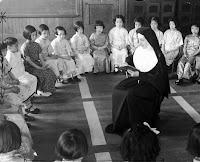When I came into this class, I must admit that I was jumping in with very little knowledge of Vietnam’s history outside of the Vietnam War—a situation I suspect many Americans share. I knew that France had had a colonial presence in Vietnam, and that a Vietnamese friend of mine always had baguettes at his house when I was growing up, but my understanding of the relationship and history of the two nations didn’t go much farther than that. So, to some degree, the most significant change in my knowledge through this course is simply a much better historical sense of the Franco-Asian relationship.
I had an interesting time this semester because I was simultaneously taking this class and an anthropology class about Africa. While I hadn’t really expected the two to correlate, it was fascinating to look at colonization in two different parts of the world, and the role of France in both. My lingering impression is that, while colonial relationships did differ somewhat by region, colonization itself had many distinctive and universal traits. These themes ranged from more expected ones, like institutionalized racism and the exploitation of material resources, to those that I wouldn’t have predicted, like the development of a sexually deviant subculture among some colonialists. To a degree, I now suspect that the very “unnatural” nature of colonization inevitably results in certain traits in colonial cultures. Colonists are constantly in the position of justifying their presence in a land not their own, creating reminders of their “superiority” by separating themselves from indigenous people, establishing both social and policy barriers to integration between the indigenous and invading cultures. In addition, in every country I’ve studied, the end of colonization in the 20th Century was as immediately destructive and, to be frank, as selfishly orchestrated, as the beginning, leaving previously occupied nations to govern themselves without a foundation to rebuild from, and often in the midst of war.
I studied in France last semester, and this class, combined with that experience, has really altered my views on the country. Growing up in the United States, the prejudice about France is that it is extremely liberal and progressive, I now realize that because of that I had harbored certain idealized notions of the French and the French government—that they dealt more rationally with problems, that their socialist and communist leanings would result in policies that would be more tolerant or somehow more enlightened. This unrealistic impression is one I was glad to have crushed by history and experience—the French, like any other people, are moved by a range of motivations, from philanthropy to selfish interest in economic gain.
Thanks for an enlightening semester!
Now for a note about some final polishing on this website:
-I finally realized that Blogger does not allow the upload of non-image/video files, so I have hosted documents like my final PowerPoint presentation elsewhere and provided links to those locations.
-I spent an hour or two reviewing old assignments for writing and grammar mistakes—I’m sure I missed some, but I sure fixed a lot, too.
-Where there were not images to illustrate essays about books or films I added them.

